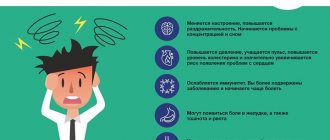Stress and illness
A sense of danger, nervous and mental tension trigger a lot of physiological functions in the body. The breath stops, the heart is pounding, the brain is feverishly looking for a way out of the situation... As soon as the dangerous situation is resolved, everything returns to normal.
For ancient people, all unpleasant situations were associated with the need to run away or catch up, and the mechanism worked perfectly. For our contemporaries, the main cause of anxiety is everyday activities and relationships with people. Psychotraumatic situations last for hours and days without dissipating, and the person does not run anywhere. This “conservation” of stress leads to the risk of obesity, heart disease, depression and many other diseases.
Talking it out is a traditional way of relaxing. But many have topics that cannot be discussed even with a psychoanalyst or priest. English scientists recommend confessing to... pets.
How can depression make you physically sick?
Depression can make you sick in many different ways. Here are a few different physical symptoms and their causes.
Diarrhea, upset stomach and ulcers
The brain and digestive system are directly connected. Depression, anxiety and stress affect the digestive process, which can cause diarrhea, constipation and nausea.
Our emotions also seem to affect the production of stomach acid, which increases the risk of ulcers. There is evidence that stress can cause or worsen acid reflux.
There is also a link between gastroesophageal reflux disease and anxiety. Depression is associated with irritable bowel syndrome.
Sleep disturbance
Sleep problems are the most common sign of depression. This may include difficulty falling asleep, interrupted sleep, and unproductive (unrestful) sleep.
There is clear evidence linking depression to sleep disorders. Depression can cause or worsen insomnia, and insomnia increases the risk of depression.
The effects of sleep deprivation increase other symptoms of depression such as stress, anxiety, headaches and a weakened immune system.
Immunity disorder
Depression affects the immune system in many ways.
When you sleep, the immune system produces cytokines and other substances that help the body fight infection. Sleep deprivation, a common symptom of depression, interferes with this process, increasing the risk of infection and disease.
There is also evidence that depression and stress are directly linked to inflammation. Chronic inflammation plays a role in the development of many diseases, including cardiovascular disease, type 2 diabetes and cancer.
Increased heart rate and blood pressure
Depression and stress are closely related and both can affect the heart and blood pressure. Unmanaged stress and depression can cause:
- irregular heart rhythm
- high blood pressure
- arterial damage
A 2013 study (https://www.ncbi.nlm.nih.gov/pmc/articles/PMC3716493/) found that depression is common in people with uncontrolled high blood pressure. It also mentioned that depression may interfere with hypertension treatment.
Losing/gaining weight
Mood often affects nutrition. For some, depression causes loss of appetite, which leads to unwanted weight loss.
For others, depression and feelings of hopelessness can lead to poor food choices and loss of interest in physical activity. Often, when depressed, a person is drawn to sweet, fatty, starchy foods. Increased appetite and weight gain can also be side effects of antidepressants.
Obesity is a common companion to depression, according to an earlier CDC study (https://www.cdc.gov/nchs/products/databriefs/db167.htm). A study conducted between 2005 and 2010 found that approximately 43% of adults with depression were obese.
Headache
According to the NFGB, 30 to 60% of people with depression suffer from headaches.
Depression and related symptoms (stress and anxiety) cause tension headaches. Depression also increases the risk of persistent headaches of increasing intensity or frequency.
Pain in muscles and joints
There is a proven connection: depression can cause pain and pain can cause depression. Pain in the back and other joints and muscles is a common physical symptom of depression.
Depression and other mood disorders alter the perception of pain, which can cause or worsen pain. Weakness, fatigue and loss of interest, so common with depression, can lead to a sedentary lifestyle. This often causes muscle and joint pain and stiffness.
Stress and hormones
Recently, the mechanism of action of stress hormones has finally become clear. It turned out that the body's response to stress is regulated by the so-called hypothalamic-pituitary-adrenal system, the control center of which is located in the deep structures of the brain. The reaction to a difficult situation causes the release of a special hormone - corticoliberin, which in turn causes the pituitary gland to produce another hormone - adrenocorticotropic hormone (ACTH). Finally, ACTH, reaching the adrenal glands in the blood, causes them to actively produce “stress hormones” - adrenaline, norepinephrine and cortisol. These three hormones mobilize the body to fight stress. The first two increase blood pressure and heart rate, redistributing blood to muscles and exacerbating reactions. Cortisol releases glucose, the universal cellular fuel, from cells.
It's not true that the best cure for stress is to scream to your heart's content. Israeli scientists studied two large groups of volunteers. In one, people behaved temperamentally under stress; in the other, they faced the blows of fate philosophically. And what: the “Stoics” had much better health! Suppressing stress leads to lower levels of adrenaline, norepinephrine and cortisol, so people who are able to control themselves are better able to overcome the challenges of life.
Birds uniquely cope with stress better than humans
The stress response in birds (and all vertebrates) is markedly similar to that which occurs in humans. The same hormones are involved, including the rise of corticosteroids (corticosterone in birds is essentially the same as cortisol in humans).
In addition, like many people, birds live in stressful conditions: searching for food, breeding and raising offspring, fighting off possible predators and migrating in an incredibly unpredictable environment.
Interestingly, scientists from the University of California's Birds and Seasonality Project have found that some songbirds, including the painted plantain and the white-crowned sparrow bunting, which migrate to the Arctic to breed, have developed a way to change their response to stress.
The Arctic is undoubtedly a very tense and complex environment that typically requires an extreme stress response. But researchers have found that birds are able to reduce and in some cases completely “turn off” their stress response, which allows them to raise offspring in extreme conditions (if the stress response remains high, birds can abandon nests).
Birds appear to be one of the few vertebrates with this ability, although researchers are still trying to figure out how birds turn off their stress response switch.
Stress, depression and sleep
It used to be that depression was when “the nerves gave way.” Nothing of the kind: the reason is a long-term increase in cortisol levels, which occurs when you have to worry constantly and for a long time.
Many people experiencing high psychological stress complain that they have difficulty falling asleep. It's all about the level of cortisol: under stress, it rises in the evening and in the first half of the night, preventing you from falling asleep. This information is very useful for doctors: it is less likely to prescribe sleeping pills to patients and more often antidepressants and relaxation in the evening.
French doctors offer an interesting way to get better sleep.
It turns out that even a century and a half ago, people slept per night... twice. The first time we went to bed at sunset, rested for 3-4 hours and woke up to lie in bed for half an hour or an hour, drink tea, and have a leisurely conversation about something. Then they fell asleep and woke up at dawn cheerful and fresh. Materials used: "Med-Info", "Health", "Aesculapius" - "Before", "AiF" - "Health"
Treating the Physical Symptoms of Depression
To relieve the physical symptoms of depression, sometimes one remedy is not enough. Although some antidepressants can also relieve physical symptoms such as pain, other symptoms may require separate treatment.
Treatment may include:
Antidepressants
Antidepressants are medications for depression. They correct the imbalance of neurotransmitters in the brain that are responsible for mood.
They can help manage those physical symptoms that are caused by common chemical signals in the brain. Some antidepressants may also help reduce pain, including headaches, insomnia, and poor appetite.
Behavioral therapy
Cognitive behavioral therapy, interpersonal therapy, and other behavioral therapies have proven benefits in treating mood and pain disorders. Cognitive behavioral therapy is also effective in treating chronic insomnia.
Stress Reduction
Techniques to reduce stress and help with the physical and emotional symptoms of depression include:
- physical activity
- massage
- yoga
- meditation
Other medicines
Over-the-counter pain relievers, such as anti-inflammatory drugs or acetaminophen, can help with headaches and muscle and joint pain. Muscle relaxants can also help with lower back pain and tension in the neck and shoulder muscles.
Anti-anxiety medications may be prescribed with a prescription for short-term treatment. In addition to helping with anxiety, these types of medications can relieve muscle tension and help with insomnia.
Natural remedies
You can try to relieve the physical symptoms of depression with natural remedies, such as natural sleep aids and pain relievers.
Omega-3 fatty acids also have many beneficial properties that help with depression and related symptoms and conditions.
What happens to your cells when you feel happy?
Positive emotions such as happiness, hope and optimism promote rapid changes in the body's cells, even triggering the release of "feel good" chemicals in the brain.
Happiness can be created artificially—through drugs or alcohol, for example—but similar increases in endorphin and dopamine levels can be achieved through healthy habits such as exercise, laughter, hugs, sex and kisses, or spending time with your child .
If you're wondering how effective and efficient this can be, then know that 10 seconds of cuddling a day can lead to biochemical and physiological reactions in the body that can significantly improve your health. According to one study, these include:
| Reducing the risk of heart disease | Reducing stress | Fighting fatigue |
| Strengthening the immune system | Fighting infection | Easing depression |
According to Dr. Marianna Pocelli, a naturopathic physician:
“In the brain, every thought that occurs in the brain releases brain chemicals. When you focus only on negative thoughts, it undermines the brain and robs it of positive power, slows it down and can even cloud the brain and make it unable to function, even creating depression.
On the other hand, if you think positively, then happy, optimistic, joyful thoughts reduce the production of (cortisol and serotonin), which creates a feeling of well-being.
This will help the brain work at peak power. Happy thoughts and positive thinking in general support brain growth and the generation and strengthening of new synapses, especially in the prefrontal cortex, which serves as the center for the integration of all brain functions.”
These physical changes in cells lead to a variety of benefits, including:
- Stimulating the growth of nerve connections
- Improved cognitive performance through increased mental performance
- Improved ability to analyze and think
- Impact on your environmental outlook and increased awareness
- The emergence of even more joyful thoughts
Heartbeat quickens. You can't catch your breath. You feel nauseous. You may have frequent headaches. You toss and turn at night and can't fall asleep, or when you wake up your jaw hurts. Symptoms of some terrible disease? Perhaps, but most likely you are just suffering from stress.
“Despite all the media attention on health, stress-related problems take most people by surprise,” says Peter G. Hanson, author of The Joy of Stress. “They know that stress can harm others, but they are never fully aware of how it can harm themselves.”
“Everyone needs something to help them cope with stress,” says Judy Leitner, public education and health coordinator in San Diego County, California. — People are overwhelmed by responsibilities and deadlines. Everyone reacts to it differently."
Ironically, older people are also susceptible to stress, even retirees who seem to do nothing but relax, says Howard Friedman, a professor at the University of California and author of The Self-Healing Personality.
“If retirement allows a person to escape from tedious, meaningless work, then taking a well-deserved break is likely to be healthy,” says Friedman. “If retirement means giving up an interesting job you love, losing economic status, or leaving friends, then taking a break may not be healthy.”
What is stress?
Everyone answers this question in their own way.
“Any event can be stressful depending on whether we see it as threatening our peace of mind, demanding more from us than we are capable of doing,” say Jean-Anne Graham and Louise M. Wallace in The Complete Book of Mind and Body "
The feeling of stress is the result of a chain reaction in the body. Demands (stressors) are placed on your mental and physical resources; you determine what these demands mean to you and how to deal with them; then you react.
Excessive stress occurs when there is an imbalance between how you perceive a requirement and how you perceive your ability to meet it. Thus, your personal perception of the situation is the key to the level of stress, which increases with each new demand.
“Small but persistent irritants can build up into major stressors,” Graham and Wallace explain, “especially when the constant pressures and crises of your life have already exhausted your reserves of patience.”
Stress can be a vicious circle. When your brain perceives a situation, real or imagined, as stressful, the sympathetic nervous system kicks in, your heart rate increases, and your blood pressure rises. You begin to breathe more often, blood rushes to the brain, muscles begin to contract voluntarily.
This instinctive response, often called “fight or flight,” prepares you to either face the enemy or run away. Although these options were quite appropriate in primitive times, they are rarely appropriate in modern society. Because of this hopelessness, a person can feel trapped, powerless, defeated, and stress reactions in his body arise anew.
When stress passes, the parasympathetic nervous system takes over: the heart rate slows, blood pressure drops, and blood is sent to the digestive organs.
As Mike and Nancy Samuels point out in their book Hyperstress, your body will eventually rebel against constant anxiety because it does not have the mechanisms to deal with intense stress over a long period of time, or even the constant presence of mild stress. Frequent or constant stressors will eventually begin to cause destruction in different organs and tissues, often simultaneously.
Prolonged stress can cause the walls of small arteries to thicken and lose their elasticity; to the habit of blood pressure receptors in the neck to higher levels; to an uneven balance of water and salt in the kidneys.
According to Friedman, “Stress is most dangerous when the body is already damaged or sick to some degree. Although biological responses to stress are based on general biological processes, they vary greatly as a function of the psychology and physiology—or psychophysiology—of the individual.”
Just as your personal view of a situation influences your response to stress, personality influences your personal view of a situation. Mike and Nancy Samuels recommend taking an inventory of your beliefs. Learn to recognize stressors and examine them objectively.
Will changing your attitude help relieve stress?
People are often divided into Type A and Type B, a simplified division between those who react more strongly to stress and those who are calmer. In general, Type A gets upset easily, gets bored easily, talks aggressively, moves quickly, has a hard time relaxing, and is very goal-oriented. Type B is more inclined to laugh at themselves and at life, less fussy and more inclined to entrust matters to others.
"Don't let Type A behavior narrow your coronary arteries, undermine your family life, squander your money, and shorten your life," advises Hanson.
Examine your reactions to different stressors and think about what can help you not succumb to stress. Graham and Wallace recommend the following techniques:
Avoidance . If a stressful situation cannot be changed, try to avoid it.
Hardening . By gradually becoming accustomed to a particular stressor, you will eventually become “immune” to it.
Intellectualization . Thinking through the stressor without emotion will help you gain the right perspective.
Relaxation . Radical relaxation using certain techniques helps reduce stress.
Imagination . Relaxing thoughts help refocus your energy.
According to The Joy of Stress, the whole idea of nursing homes was based on "protecting" older people from the stresses of everyday life (shopping, traffic, household chores, gardening, etc.). It is now clear that relieving these stresses can be detrimental to older adults (unless medical problems make these activities impossible).
Older people may not even understand that they need some kind of activity or business. Boredom is the most common source of stress among retirees and often leads to depression and decreased activity in general.
The physical changes associated with aging can also increase stress. But rather than getting upset over changes you can't do anything about, like going bald, it's much more productive to focus on what you can change, like your overall fitness.
"Your muscles don't know the date on your birth certificate," Hanson says. “They only know that they haven’t been warmed up for a long time.”
Another common stressor is fear of illness, surgery, or hospitalization.
James Dietsch, a psychiatrist in Laguna Hills, California, says that most of the stressors that older people experience involve feelings of loss—for example, career end, sexual impotence, physical ailments, loss of memory, loss of intelligence, decreased income. Plus, “as people age, they lose old friends,” Dietsch says, “and it becomes more difficult to make new ones because of ingrained habits.”
Losing friends can lead to increased emotional dependence on family. But if you don't have family nearby or can't see them as often as you'd like, the feeling of isolation increases. In such cases, Dietsch recommends that his patients redouble their efforts to communicate with other people. “Just when they want to distance themselves from everyone, they need other people most,” he says. Ditch advises older adults to seek out and create situations for themselves that give life meaning, which will help them stay physically and mentally active longer.
“Stress can be productive or fatal. It's all up to you,” says Hanson.
And also on the topic:
Even moderate stress can lead to disability
People tend to underestimate the dangers of mild stress. However, it can lead to disability and long-term disability, scientists say. They did a study...
Stress prevents you from losing weight
Stress may be one of the factors preventing you from losing weight, according to American researchers from the University of Florida. They found that under stress...
Parenting stress leads to obesity in children
American researchers have found that obesity in children directly depends on the level of stress in the lives of their parents. The study involved 2119...
Does switching to winter time cause stress?
Scientists and researchers have long found an unequivocal answer to this question - YES.
In addition, Swedish scientists were able to find a direct... Print page
2 comments on “Stress is a disease”
- AlisaJuly 3rd, 2013 - 10:24
I am now in a state of constant stress. This is not only due to work, but also problems in the family. I understand that this is a huge problem, a real disease. This article describes everything correctly - Zinaida NikitichnaJuly 3rd, 2013 - 11:28
The media constantly broadcast all sorts of bad news. Either accidents or climate threats. I understand that I need to drive away bad thoughts from myself, but sometimes it doesn’t work. Communication with friends and loved ones only makes me happy.










